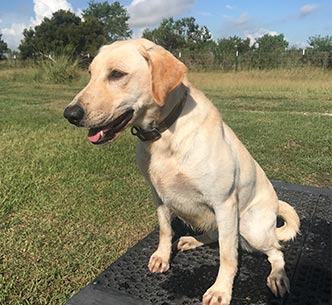 As I type this article on hunting dog training, the season is upon us. In just a few short days the south zone dove season will begin, followed by teal season and then less than two months later duck and goose season. If you are a wing shooter then it is getting to be your time of year.
As I type this article on hunting dog training, the season is upon us. In just a few short days the south zone dove season will begin, followed by teal season and then less than two months later duck and goose season. If you are a wing shooter then it is getting to be your time of year.
It is a fact that not everyone who hunts ducks, dove, or geese has a Labrador retriever to handle the job of fetching. However, most hunters who are avid will eventually end up with one. There is something about owning and hunting with a well trained retriever that seems to make the experience even more rewarding and fulfilling.
Hopefully, your dog is tuned up and ready for this season. If this is not the case then I would like to share a few ideas with you. As a professional duck dog trainer for the past 25 years, I have helped countless clients get their dogs ready for the season. When a dog comes to our kennel, there are some very specific goals that we have in mind. Our training program follows certain steps in order. This allows us advance duck dogs in a timely manner. Here is the order of our hunting dog training program. By following these steps you should be well on the way to a great dog.
1). Perfect obedience
When I say perfect obedience, I mean perfect obedience. This is a dog that will heel, sit, stay, and come on command the first time it is told. The dog needs to do this without a leash and with distractions. Obviously a leash is necessary in the beginning, but it should be phased out as the dog advances. This type of obedience is imperative before a dog ever enters the blind to hunt. A dog that has great obedience is a safer more enjoyable dog to be around.
2). Hand delivery
I can’t tell you how many times I have seen a client train their do and tell the dog to drop the bumper upon returning. This is not the correct procedure. Never ask your dog to simply drop the retrieve on the ground. It is important that you always ask for a hand delivery. Why is this important? The answer is simple if you think about it. Let’s say your dog makes a nice retrieve on a crippled duck. When he gets back to the blind he drops the duck. The duck takes off in the blind and the dog quickly follows. Every hunter in the blind has a loaded gun propped against the blind. As the dog chases the duck he begins to knock down the loaded guns…… can you see where this is going? Insist on a hand delivery.
3). Marking skills
In order to be a proficient hunter your dog must learn to mark birds that it sees fall. This is taught with single birds first but then advances to doubles and triples. It is important that your dog learn to remember the multiple birds in the field. Through much training and practice, this skill should continue to sharpen. A dog that marks great will not have to run as many blind retrieves.
4). Steady to shot
This is a huge deal when it comes to safety. A dog that is not steady to shot has a great chance of being accidentally shot on a hunt. By steady I mean that the dog doesn’t move when the shooting starts. He only goes when his name is called. Many hunters and guides fail to instill this in their dog and the dogs leave prematurely. This not only decreases the dogs ability to mark the birds being shot, but as I mentioned earlier, it increases the chance for an accident. The simple solution is to insist on steadiness every single time. A dog that refuses to be steady should be left at home until it learns the skill, or should be tied on a short lead in the blind. Steadiness is imperative.
5). Blind retrieves
This is where a dog learns to follow whistle commands and hand signals to a bird that it did not mark. This is the most advanced part of training and many dogs are never advanced to this level. However, if your dog is proficient at long blind retrieves in excess of 100 yards, it will make hunting even more fun. These dogs will rarely lose a duck.
I hope this training schedule helps. Remember that it is important to start with number one and work through them in order. I have shared with you the secret order of what to do but haven’t told you exactly how to do it. If you need help with the how to part please feel free to give as a call at DuckDogTrainer.com (409)460-2314. We will be glad to answer questions or to enroll your dog in our program. May God richly bless you this season and may your bird straps be full!!





